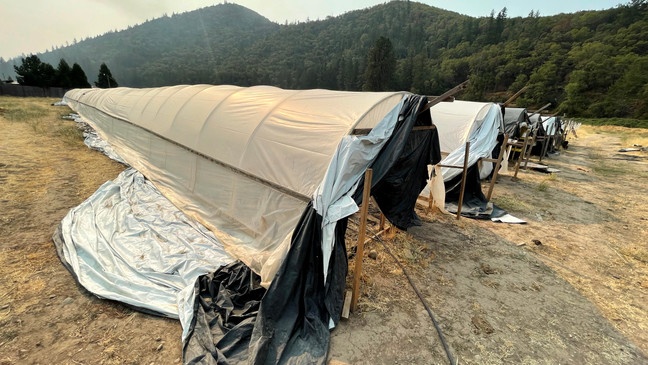Oregon officials say illegal marijuana operations in some rural areas of the state are financed by foreign criminal gangs and drug cartels whose strategy is to expand operations faster than law agencies can shut them down.
The legislature last week passed the Illegal Marijuana Market Enforcement Grant Program, providing $25 million in funding to help police crack down on the illegal grows, which often masquerade as hemp operations, according to law officials.
Both hemp and recreational cannabis are legal but regulated in Oregon.
Business model
Nathan Sickler, Sheriff in Jackson County, told lawmakers the illegal operators “have a business model: Put up more cannabis illegal grows than law enforcement can ever get.”
“They know we’re going to get some, but they know we can’t get it all,” Sickler told television station KVAL.
Sen. Jeff Golden, a Democrat legislator from Ashland in Jackson County, said the marijuana operations, many of which employ armed guards, often resemble “military-weapons zones, like the ones we usually associate with failed states.”
Golden said the growers are also illegally tapping into the area’s limited water supply, abusing local workers, threatening neighbors and negatively impacting legal cannabis growers.
Water, labor violations
Law agencies say costs have ballooned as they attempt to police farms not only for illegal marijuana growing and water theft, but also for labor violations.
A bipartisan group of legislators wrote to Gov. Kate Brown earlier this year noting that workers on the illegal farms are subjected to “conditions approaching slavery.” Previous busts have revealed substandard living conditions on the plantations, which employ mostly migrant, seasonal workers.
Under funding guidelines, police agencies that apply for the new grants will have to work with community-based organizations that deal with labor trafficking. The funding is to be administered by the Oregon Criminal Justice Commission. Of the $25 million, $5 million is dedicated to enforcing water rights.
Big business
The scale of the illegal growing, much of which is concentrated in Jackson, Josephine and Klamath counties at Oregon’s southern border with California, was indicated in a bust last month in which police seized roughly 250 tons of marijuana with an estimated value of half a billion dollars.
The illegal growers are reported to be paying exorbitant prices for property, labor, and water rights, giving them advantages over legal growers and hampering hemp farmers.
Josephine County Sheriff Dave Daniel told KVAL the funding will help, but described the problem with illegal grows as “metastasizing statewide.”
Inspectors needed
Farmers have said the state needs more inspectors to sort out hemp operations from those producing marijuana, and that some landowners are contributing to the problem by selling or leasing property to unscrupulous operators.
“If somebody walks onto your property with a suitcase with $100,000 in $20 bills, you kind of know they’re not on the up and up,” one farmer told KVAL. “And if you take that money and allow them to do something on your land, you should probably anticipate that they’re there to break the law.” The farmer told the station he spoke anonymously out of fear of retribution by the cartels.
The latest funding measure comes after the legislature last July passed a set of amendments to reduce the burden on resources needed to police illegal marijuana operations. Those changes also allow law enforcement greater flexibility in destroying illegal grows and processed cannabis.

